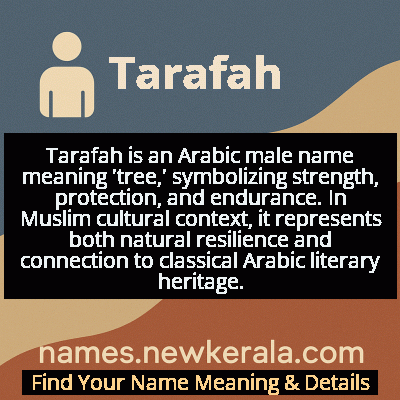Tarafah Name Meaning & Details
Origin, Popularity, Numerology Analysis & Name Meaning of Tarafah
Discover the origin, meaning, and cultural significance of the name TARAFAH. Delve into its historical roots and explore the lasting impact it has had on communities and traditions.
Name
Tarafah
Gender
Male
Origin
Muslim
Lucky Number
1
Meaning of the Name - Tarafah
Tarafah is an Arabic male name meaning 'tree,' symbolizing strength, protection, and endurance. In Muslim cultural context, it represents both natural resilience and connection to classical Arabic literary heritage.
Tarafah - Complete Numerology Analysis
Your Numerology Number
Based on Pythagorean Numerology System
Ruling Planet
Sun
Positive Nature
Leaders, ambitious, highly driven, self-reliant, innovative.
Negative Traits
Overly aggressive, domineering, impatient, selfish.
Lucky Colours
Red, orange, gold.
Lucky Days
Sunday.
Lucky Stones
Ruby, garnet.
Harmony Numbers
2, 3, 9.
Best Suited Professions
Entrepreneurs, managers, engineers.
What People Like About You
Courage, determination, leadership.
Famous People Named Tarafah
Tarafah ibn al-Abd
Pre-Islamic Poet
Author of one of the seven Mu'allaqat poems, celebrated for his eloquence and tragic life story
Tarafah al-Bakri
Islamic Scholar
Preserved and transmitted early Islamic knowledge through Hadith scholarship
Tarafah al-Harith
Military Commander
Early Muslim warrior who fought in key battles during Islam's formative period
Name Variations & International Equivalents
Click on blue names to explore their detailed meanings. Gray names with will be available soon.
Cultural & Historical Significance
In Islamic contexts, the name maintained relevance through later historical figures while carrying forward classical Arabic cultural elements. The tree symbolism aligns with Islamic values of providing shade and shelter to others, representing charity and protection. For modern Muslim families, choosing Tarafah often reflects a desire to honor Arabic literary tradition while maintaining religious identity, creating a cultural continuity that respects both pre-Islamic heritage and Islamic values. The name serves as a living connection to Arabia's rich poetic history.
Extended Personality Analysis
Individuals named Tarafah typically exhibit characteristics reminiscent of their name's arboreal meaning - they are often deeply rooted in their values, patient, and resilient in facing life's challenges. Like trees that weather storms yet continue growing, Tarafahs demonstrate remarkable emotional endurance and the ability to recover from setbacks. They tend to be protective and nurturing toward their loved ones, creating a sense of security and stability in their relationships. Their strength is often quiet but profound, manifesting as reliability and consistent support for others.
Culturally influenced by the name's poetic associations, many Tarafahs display artistic sensitivity, eloquence in communication, and appreciation for literature and tradition. They often possess a contemplative nature, thinking deeply before acting or speaking. While they may not seek the spotlight, their presence is felt through their steady influence and the wisdom they share. The combination of natural symbolism and literary heritage creates individuals who balance practical strength with cultural sophistication, making them respected members of their communities who honor tradition while navigating modern life.
Modern Usage & Popularity
In contemporary naming practices, Tarafah maintains a niche but meaningful presence, primarily among Arab families and Muslim communities with strong connections to classical Arabic culture. The name experiences periodic revivals when literary or historical awareness increases, particularly in educational circles. While not appearing on most popular baby name lists, it holds steady usage in countries like Saudi Arabia, Jordan, and the UAE, where families value names with deep cultural and historical significance. Among diaspora communities, Tarafah serves as a cultural anchor, helping maintain connection to Arabic literary heritage. Modern usage often reflects parental interest in unique names with substantial meaning, avoiding trends while choosing names that carry weight of history and tradition. The name's rarity in contemporary times adds to its appeal for families seeking distinctive yet culturally rich names for their sons.
Symbolic & Spiritual Meanings
Symbolically, Tarafah embodies the profound metaphor of the tree - representing strength through rootedness, growth through adversity, and generosity through protection. The tree symbolism extends to concepts of family lineage and cultural continuity, suggesting deep connections to ancestry and tradition. Like a tree that provides shade, the name symbolizes the Islamic value of offering comfort and protection to others, particularly the vulnerable. The tree's seasonal cycles represent the natural rhythms of life, death, and renewal, suggesting philosophical depth and acceptance of life's transitions. In Sufi traditions, trees often symbolize the spiritual seeker's growth toward enlightenment, adding mystical dimensions to the name. The combination of natural endurance and cultural legacy creates a rich symbolic tapestry that makes Tarafah a name carrying multiple layers of meaning about identity, heritage, and human resilience.

